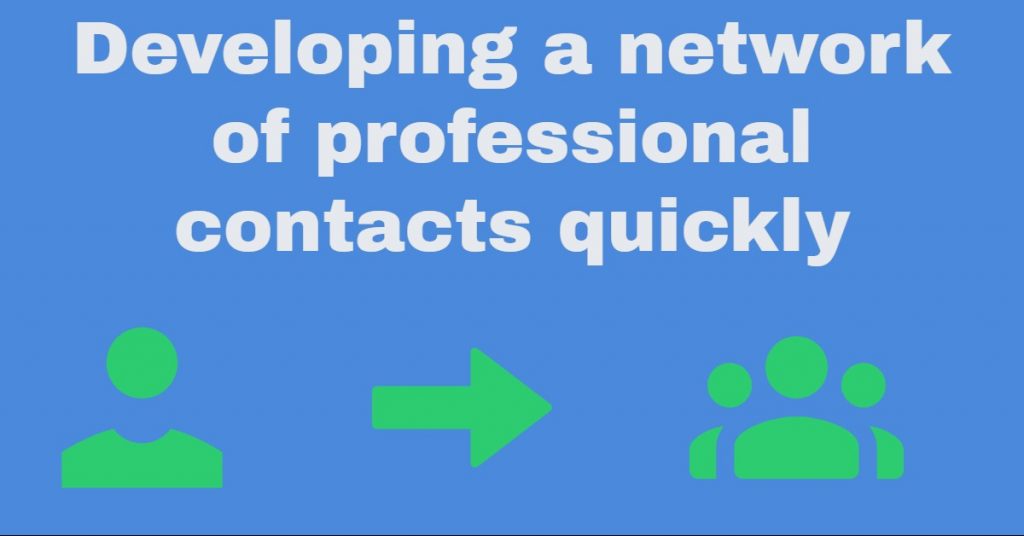Developing a network of contacts quickly on Linkedin

Developing a network of contacts on Linkedin
Linkedin can be a valuable tool as both a source to find work as well as to enhance your career. It is worth spending time to develop a relevant contact list that could open up opportunities now or in the future.
Linkedin is for the contacts you know and who you want to know.
Building your contact list on Linkedin
The more “relevant contacts” you have increases the chance of opening up opportunities. So with this in mind we suggest having a two tier strategy.
Existing contacts and friends who know you. They are valuable even if not in your industry as will support you with posts/requests you may make online.
The contacts you want to know. This requires researching relevant companies/organisations and approaching them to become part of your network on Linkedin.
Targeting colleagues and friends.
Linkedin feeds into your email list so this can be naturally down and is quite simple. However it is well worth doing extra work outside the support Linkedin provides.
List the School/University colleagues you want as contacts: The University colleagues who have studied the same course as you can become particularly valuable as they have a good chance to be working in similar roles/organisations you are targeting.
Make a list of former/present work colleagues (including business contacts/clients): Is there anyone you have missed? Is there anyone from this list you feel could provide a glowing recommendation of your work you would like to have on your profile.
Targeting contacts you want to know.
Any contact in the industry you want to work in could be valuable! So it is worth spending time building a list of contacts you want to know.
Which companies/organisations are relevant to where you want to work? Draw up a list of potential of companies you want to target.
What job roles are you seeking? Draw up a list of potential roles you would want to apply for.
What industry groups are relevant to yourself? Source groups in Linkedin that are relevant to your industry and work you seek. They are full of contacts and you can also message people directly even if they are not a direct (1st) contact.
Researching relevant people/companies to connect with: Boolean Search Trick
Boolean/Google Search Trick (To find people on Linkedin without paying them money)
Linkedin limits you to the profiles you can see based on your connections with people. However using a Boolean search on Google you can find peoples public profiles you have no connection with including people in other countries.
This is the core Boolean search code: site:uk.linkedin.com/in/ OR site:uk.linkedin.com/pub/
To find people in a company: Lets use the famous organisation NASA as an example. We add “Nasa” using inverted commas to the boolean search code above and post into Google. site:uk.linkedin.com/in/ OR site:uk.linkedin.com/pub/ “Nasa”
You should see 100’s of linkedin profiles of people who work at Nasa. These are people you could connect with on Linkedin.
To find a specific job title: Lets look for astronauts as an example. We add “Astronaut” using inverted commas to the Boolean code and post into Google. site:uk.linkedin.com/in/ OR site:uk.linkedin.com/pub/ “astronaut”
You should see profiles of Astronauts listed.
To find a job title within a specific company: Lets use Astronauts working for Nasa. You use the Boolean code and then add “Nasa” AND “astronauts”
site:uk.linkedin.com/in/ OR site:uk.linkedin.com/pub/ “Nasa” and “Astronauts”
You will see astronauts who work for NASA appear.
Companies/Organisations Research
There are a range of things you can do develop a target list of companies
Develop a list of target companies you may want to approach direct for work and follow online for vacancies they may advertise. Use an Excel Spreadsheet to keep track of the companies you source.
Exhibitions (A great source for companies and contacts). In the UK Excel, Olympia and NEC host many events each year. Look at events which are relevant to yourself go to their web page and look for a list of exhibitors. This is a great way to source companies.
Industry Associations: Look for relevant associations to the industry you work. If they have members lists this is a great way to source relevant companies/organisations and with it contacts on Linkedin.
Use Search engines such as google to source relevant companies/organisations. A search for companies/organisations on google can be sometimes as simple as just doing a search on Google or another search engine.
Search Linkedin: Use the different search facilities on Linkedin to source companies. Join groups and look at similar peoples profiles in that group. This should help give you a source of relevant companies as well as connect with people in your group. If looking groups can be a good place to post that you are seeking work.
Use the Boolean/Google Linkedin Search: As stated above the Boolean/Google search helps find potential people and companies. A search for relevant
Job Titles Research
Using the Boolean search to find people in another country
Approaching people to connect with?
If you find someone you would like to connect with than it is important to approach them in the best way that will make them accept your connection.